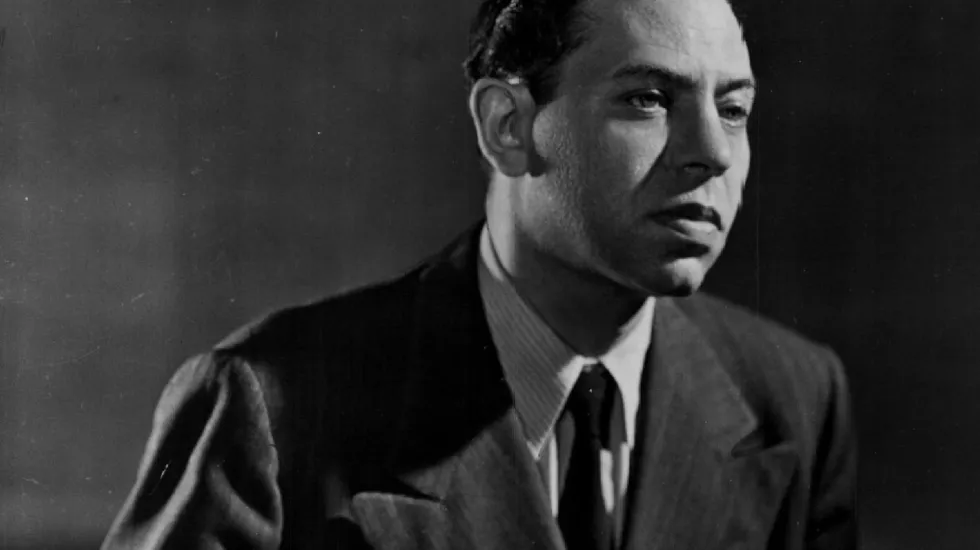
The first time playwright Doug Wright encountered Oscar Levant was around 2009, while working on a screenplay for a proposed but never made Steven Spielberg film about George Gershwin.
“It’s impossible to research Gershwin’s life without encountering the wonderfully acerbic and grouchy Oscar Levant,” Wright says. “He was one of Gershwin’s dearest friends, and I found him utterly fascinating.”
In the 1940s and 1950s, Levant was a household name. He was a bestselling author, radio and television host, quiz show panelist, actor, brilliant pianist and composer as well as a popular interpreter of Gershwin’s music (he topped the charts with his 1945 rendition of “Rhapsody in Blue”). Levant also was an edgy loose cannon and master of the stinging one-liner who suffered from mental illness.
Wright, whose plays “I Am My Own Wife” and “War Paint” were staged at the Goodman Theatre, now brings “Good Night, Oscar,” his new play about one period in Levant’s life, to the theater for its world premiere. Sean Hayes, best known as Jack on the sitcom “Will & Grace,” portrays Levant.
‘Good Night, Oscar’
When: March 12-April 17
Where: Goodman Theatre, 170 N. Dearborn St.
Tickets: $25-$98
More info: goodmantheatre.org
It was about 10 years ago that Wright’s interest in Levant was revived when theatrical producers Barbara Whitman and Beth Williams approached him about writing a play with Levant as its central character, already with Hayes in mind to play him.
Hayes had his own longtime interest in Levant. About two decades ago, a friend told Hayes he should play Levant. He’d never heard of Levant but did his research.
“I just loved him,” Hayes says. “His wit is just so fast and clever. And there are so few people with that kind of talent. And I was really drawn to his struggles in life.”
Hayes grew up in Glen Ellyn and studied piano at Illinois State University. He was music director and performed in productions at Pheasant Run Theater in St. Charles for a short time before leaving at 25 for Los Angeles and a career in television and film.
“Sean is one of the great comic actors of our age,” Wright says. “This role is truly out of the box and unlike anything he’s done before.”
Levant is little known today. Hayes and Wright want to change that. It was a research-heavy project, says Wright, a Pulitzer Prize-winner for “I Am My Own Wife.”
“My first task was to catch up with Sean because he knew so much,” Wright says. Levant wrote three “very hilarious memoirs, so I had those to draw from as well as biographies and videos.”
He also drew on the knowledge of cabaret star Michael Feinstein, a scholar of Levant’s music.
“Oscar’s a brilliant raconteur and a hilarious comedian, but so much of that comedy stems from a very deep well of pain,” Wright says. “I think that makes him a really ripe subject if you want to write about comedy, its true origin, what are and are not suitable subjects for humor and what is the personal cost comedians pay when they hold up their own lives as fodder for art and amusement.”
The plot is based on several incidents in Levant’s life. Wright also employed dramatic license. The setup for the play was based on Levant’s being committed to the mental health wing at Mount Sinai Hospital in Los Angeles by his wife June. Levant was desperate to get out to do an episode of his own and got a four-hour pass.

Wright set the play around the same time in 1958 but transfers the TV appearance to the NBC studios as Levant, fresh from the hospital, prepares to be on “Tonight Starring Jack Paar.” (Levant and Paar were friends in real-life).
“I wanted to tell that story, but I wanted to do it in a way that people would recognize, and Paar’s show was much more celebrated,” Wright says.
It’s thought Levant might have been manic depressive. He spent time in mental institutions and received prescription drugs to which he became addicted. He spoke openly about his deteriorating mental health, his neuroses and hypochondria on live television. He’s been called “America’s first publicly dysfunctional celebrity.”

Hayes found many connections with Levant.
“Oddly, I shared too much in common with Oscar,” Hayes says. “I was diagnosed with anxiety and depression in the past and studied intense piano for years, as did Oscar. I relate mostly to his plight and his kind of place in the world, although I don’t suffer nearly as deeply as he did with anxiety and depression.”
It’s difficult today to imagine how taboo this all was for Levant in the 1950s.
“Before Dave Chappelle, before Richard Pryor, before George Carlin, before Lenny Bruce, there was Oscar Levant,” Hayes says. “I think Oscar needed the laughter in his life. In a sense, I think he viewed it as therapy so that he could feel a sense of normalcy. It’s corny to say that laughter is the best medicine. But, for him, I think it was.”
Wright says he hopes the play “restores our cultural awareness of Levant.
“He did what all artists do, which is carve out a piece of his heart and hold it up for public inspection and hope that people recognize themselves in it. But I think that all comes at a cost to your privacy and sometimes your well-being. It’s a certain kind of bloodletting when your work is that personal and that naked, and I think Oscar did pay a price for it.”







